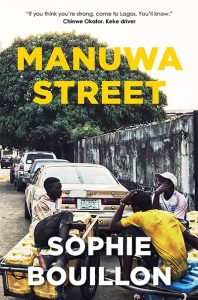’
In my hunt for a good book to read, I came across MANUWA STREET, a book of 108 pages written by Sophie Bouillon, a French journalist, Lagos babe, ex-Deputy Bureau Chief at Agence France-Press.

It’s a small book richly packed with portraits and sketches of Lagos, a city she knows so well. A city she captures in beautiful poetic prose in her PROLOGUE which opens: “Lagos will make you feel alive. It will kill you too. Here, you will be wrong about everything. Nothing will make sense anymore…Here, the planet breathes noise and pollution. Lagos makes millionaires and knocks people into poverty. Here, nature thrives as much as it self-destructs…Lagos is a story of destruction. Homelessness. Uprooting. She spits out newcomers every morning. They pile up on the sidewalks like dead turtles washed up on the beaches of the Atlantic coast.” I fell in love instantly with this blunt book about the way we live in Lagos. Today, I bring you an excerpt on its reportage of the day Lagos burnt “under the banner #EndSARS.”*** It all started with a mundane incident of police brutality, a minor tragedy of the kind to which everyone is accustomed. At the start of October 2020, a young man had been shot by the Special Anti-Robbery Squad, popularly known as SARS, as he was driving a brand new white 4×4 on the streets of Ughelli, in Delta State. His Lexus SUV, “seized” by police officers right after his death, was the tangible and incontrovertible proof that the young man was a “Yahoo boy.” Tragically, this type of minor news item happens almost weekly in the country, but this time it was filmed by passers-by. No one remembers his name now, but he became the Nigerian George Floyd and the one through whom the people’s anger arrived. On social media, the video of his murder spread gently, unnoticed, before mutating into a hashtag over the course of a few days. Under the banner #EndSARS, internet users were now recounting their own experiences with police brutality, torture, arbitrary arrests and kidnappings. They denounced the assassinations of their close relations. Soon, tweets flowed in from every direction. The movement spread to the United States, to London, throughout the diaspora, and came back to Nigeria. #EndSARS travelled from Twitter to Facebook, from Facebook to Instagram, multiplied in retweets, amplified by likes. It was now carried by Afropop singers and beloved icons. Wizkid galvanized the London diaspora. Davido stirred his millions of Twitter followers. Burna Boy spent millions of naira to cover the country’s largest advertising billboards with the rallying symbol of the movement. Kanye West, Cardi B and Twitter founder Jack Dorsey got involved, and in less than a week #EndSARS, the rebellious cry of Nigerian youth, became the number one trend online globally. The protest 2.0 virus had totally escaped the authorities. At first, there were just a few dozen who dared leave the internet to take to the streets of Ughelli, Port Harcourt, Lagos and Abuja. After a few days, there were hundreds. In mid-October, two weeks after the start of the movement, thousands of people took shifts day and night on the two major arteries of Lagos. The Lekki toll gate, a twenty-lane motorway and nerve centre of the city was totally occupied, slowly paralysing and asphyxiating the megalopolis. The atmosphere was joyous. Coronavirus seemed to have disappeared. But everyone bore the invisible scars inflicted by the lockdown and its economic crisis. DJs followed one after another at the turntables. The young danced, with or without masks. They no longer danced to forget, but to make themselves heard. Those who had never known military dictatorships, those who had never lived with fear in their heart, were crying out in anger, shouting out how proud they were to be Nigerian. “They messed up with the wrong generation!” I dared to ask who “they” were. “All of them! All of them! All these politicians,” they shouted. “All these thieves!”In the early day of the protest, some demonstrators parked in the middle of the crowd. Seated on the hood of their Mercedes coupe or of their sedan, they all raise the closed fist of the revolution towards the sky. They waved their green and white flags. On a Friday evening, thousands of Muslims spread out their mats under the gate to implore Allah to answer their prayers. Christian watched them in silent solidarity. Some went to pray with them. Then on Sunday morning, Christians invited pastors and organized open-air church services. Muslims recited the Our Father and said a few amen with their eyes closed. Students and street kids, believers and atheists, feminists and homosexuals, celebrities and their fans, rich and poor, the bullied, the oppressed, the blackmailed…They were all there, together, under the same rallying cry #EndSARS. They were all part of this magnificent union of people, elevated by their yearning for freedom. All the restaurants of the city, which had only just reopened following the relaxing of the lockdown restrictions, prepared food non-stop for distribution, free of charge, to the demonstrators. Business and private citizens handed out water and masks. On social networks, impressive fundraising initiatives had paid for placards and the rental of stages, microphones and giant screens. Doctors, still exhausted after months of the pandemic, organized first aid services. Armies of volunteers picked up the trash every morning to make way for ever more people. For the first time in history, Lagos wasn’t obsessed with money. I bumped into Femi from Manuwa Street, in the middle of the crowd. He hugged me and lifted me up in the air, as if the large gate separating our lives had finally swung open. He was happy. “Today na our real independence,” he shouted. “Sophie, you know we’re here because of Fela; he gave us courage. Enough is enough. Dem put wall for our front, we climb am. Dem raise am up, we suffer climb am again. Now, the wall is too high. We no fit. E don do!”He proudly led me through the occupied toll gate. Here, white and green Nigerian flags were being distributed. There, a marketing company had made a glittery installation with EndSARS written in giant letters. Besides it, demonstrators were taking selfies to post immediately on Instagram. Artists came to paint. Nollywood actresses had swapped their sparkly, skin-tight, faux-diamond-laden dresses for sweatpants and were getting ready to spend the night in their cars. One of the P-Square brothers was sitting on his red Hummer with his entourage of groupies and managers. He was stirring up the crowd and answering journalist’s questions. Femi continued his tour and spat out his anger. “If we get fine car, dem go call us Yahoo boys, come waste our lives. If we get dada, dem go say we dey smoke igbo. If we wear earring, dem go call us gay, collect our money. If na woman you be, dem go call you ashewo, com rape you join. E don do! We no dey live free life for this country!”I left there galvanized by this intoxicating combination of hope and benevolence. Nobody knew what tomorrow was going to bring.
Share your story or advertise with us: Whatsapp: +2347068606071 Email: info@newspotng.com











